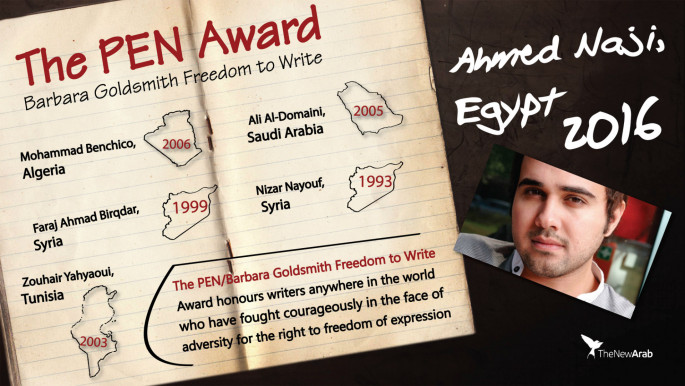Egypt court rejects novelist Ahmed Naji's prison term suspension
A Cairo court has rejected a request filed by novelist Ahmed Naji to suspend a two-year prison term he is currently serving pending appeal.
Naji, the recipient of the 2016 PEN/Barbey Freedom to Write Award, received the two-year sentence in February for "destroying social values" after publishing "sexually explicit content" in a literary magazine.
His trial came after state-owned newspaper Akhbar al-Adab released an excerpt in 2014 from his novel Using Life that contained explicit sex acts and references to habitual drug use.
He was acquitted in January but the prosecution appealed the verdict and he was sentenced in a retrial.
The initial legal complaint was filed against Naji and editor-in-chief of Akhbar al-Adab Tarek al-Taher by one of the newspaper's readers, known as Hani Saleh Tawfik.
The plaintiff claimed that the indecency of the text in question caused his "heartbeat to fluctuate, along with a sharp drop in blood pressure".
Naji was honoured by PEN, a literary society and human rights organisation comprising thousands of writers, editors and translators, at its annual gala in Manhattan last May.
"Naji's case is emblematic of Egypt's escalating crackdown on artistic freedom in flagrant disregard for its own constitutional protections and at the expense of the country's rich cultural traditions," PEN America Executive Director Suzanne Nossel told The Associated Press in April.
"PEN hopes that this award will spur writers, readers, advocates, and world leaders to press Egypt to release Naji immediately and to stop treating creativity as a crime."
 |
Naji's case is emblematic of Egypt's escalating crackdown on artistic freedom in flagrant disregard for its own constitutional protections and at the expense of the country's rich cultural traditions. - Suzanne Nossel |
 |
In solidarity with the imprisoned writer, many websites have re-published his excerpt, including an English translation by Ben Koerber on ArabLit, a leading blog on Arabic literature in translation.
The verdict was also condemned by fellow writers and journalists, as well as readers, scholars and human rights advocates from Egypt and other countries.
They declared their support and demanded his immediate release, stating that his prison sentence was unconstitutional.
"The continuation of such policies will further block the relation between intellectuals and the authorities," the Egyptian Initiative for Personal Rights said in a statement at the time.
Naji's sentence followed a one-year sentence handed to TV presenter and researcher Islam Behery for "defaming religious symbols", and three years to writer Fatima Naoot for allegedly defaming Islam.
 |
| [Click to enlarge] |





 Follow the Middle East's top stories in English at The New Arab on Google News
Follow the Middle East's top stories in English at The New Arab on Google News


